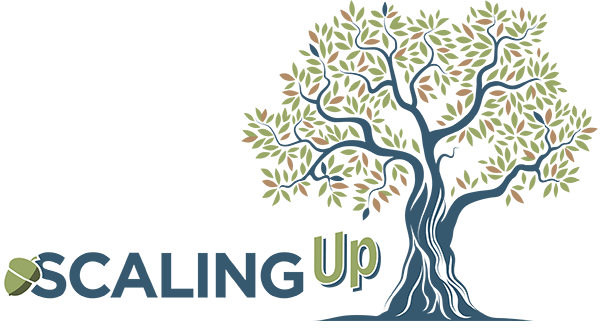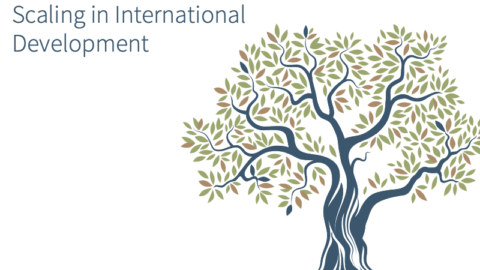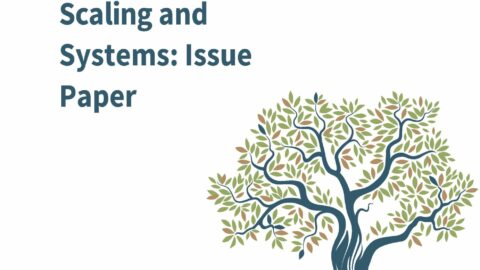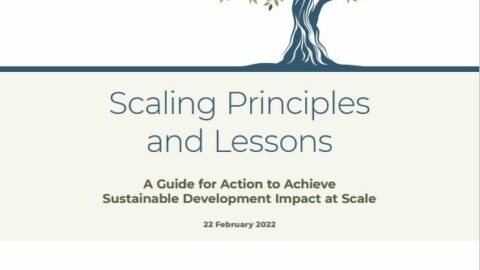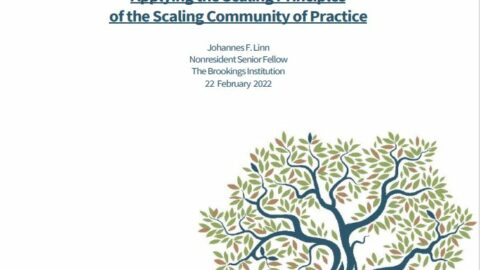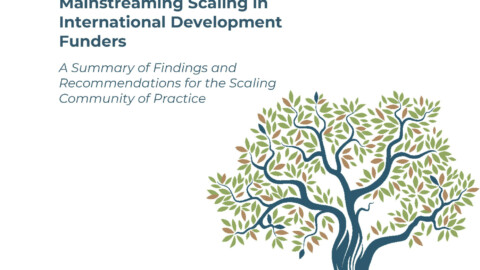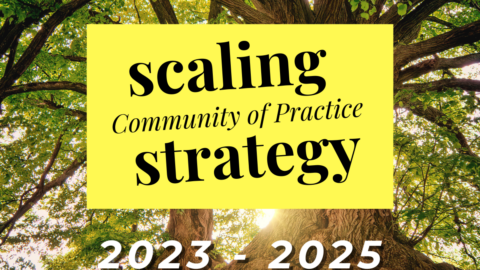Preface
The Scaling Community of Practice (CoP) launched an action research initiative on mainstreaming scaling in funder organizations in January 2023. This initiative has three purposes: to inform the CoP members and the wider development community of the current state of support for and operationalization of scaling in a broad range of development funding agencies; to draw lessons for future efforts to mainstream the scaling agenda in the development funding community; and to promote more effective funder support for scaling by stakeholders in developing countries. (For further details about the Mainstreaming Initiative, see the Concept Note on the COP website).
For the purpose of this study, scale is defined as sustainable impact at a significant share of the need, demand, or problem. Scaling is the process of reaching scale. Mainstreaming of scaling is defined as the systematic consideration by the funder of the scaling process in the appraisal of a project, in the decision to fund it, and in the monitoring and evaluation of the project’s implementation.
The Mainstreaming Initiative is jointly supported by Agence Française de Développement (AFD) and the Scaling Community of Practice (CoP). The study team consists of Richard Kohl (Lead Consultant and Project Co-Leader), Johannes Linn (Co-Chair of the Scaling CoP and Project Co-Leader), Larry Cooley (Co-Chair of the Scaling CoP), and Ezgi Yilmaz (Junior Consultant). MSI staff provide administrative and communications support, in particular Leah Sly and Gaby Montalvo.
The principal component of this research is a set of case studies of the efforts to mainstream scaling by selected funder organizations. These studies explore the extent and manner in which scaling has been mainstreamed, and the major drivers and obstacles. The case studies also aim to derive lessons to be learned from each donor’s experience, and, where they exist, their plans and/or recommendations for further strengthening the scaling focus.
The present case study focuses on International Fund for Agricultural Development (IFAD). It was prepared by Johannes F. Linn.
Acknowledgements
The support of current and former IFAD managers and staff in providing insights and experience in interviews and in commenting on a draft of the report is gratefully acknowledged. Comments on the draft were also received from Carlos Manuel Icaza Lara and Richard Kohl. No funding was provided by IFAD for this case study.
Executive Summary
The International Fund for Agricultural Development (IFAD) is a midsize multilateral international finance institution established to support agricultural and rural development in low and middle income member countries, with a special focus on often neglected or difficult to reach smallholder farming communities. IFAD has actively pursued mainstreaming of a scaling agenda in its operations since 2002. This makes IFAD in many ways an exceptional case among its funder peers, since few if any have so systematically focused on scaling as a way to enhance and sustain the development impact of the interventions that they fund.
This case study of IFAD’s mainstreaming efforts is part of an action research initiative of the Scaling Community of Practice. Based on interviews, document review and the personal experience of the author as an adviser on scaling to IFAD and as chair of three replenishment consultations, it traces IFAD’s mainstreaming journey over two decades and analyzes what were the main enabling conditions – drivers and obstacles – for scaling. The paper concludes with a set of recommendations for IFAD management and with lessons for the funder community at large.
Like all the other case studies under the Mainstreaming Initiative of the Scaling Community of Practice, this case study focuses principally on whether, when and how IFAD has pursued mainstreaming of scaling as a change management process and the extent to which this has been reflected in project design and implementation. It does not focus on whether this has led to more effective scaling up in IFAD-supported programs or what has been the longer term development impact of scaling efforts. These questions are important, but go beyond the scope of this study.
The study finds that IFAD’s mainstreaming effort can be divided into five distinct phases:
- 2002-2008: early efforts to anchor scaling in IFAD’s strategy and independent evaluations of IFAD’s scaling in its operations;
- 2009-2012: detailed analysis and evaluation of IFAD’s prevailing scaling practice and efforts to develop a mainstreaming approach, with the support of a joint Brookings/IFAD team leading to IFAD declaring scaling as “mission critical;”
- 2013-2017: an intensive and comprehensive mainstreaming effort in IFAD’s strategy and operations, with the development of an operational mainstreaming framework, establishment of an organizational anchor, integration of scaling in the operational processes, extensive knowledge work, and an independent evaluation of IFAD’s mainstreaming efforts;
- 2018-2021: a partial pause in IFAD’s mainstreaming efforts, due to changing priorities of a new senior management team and disruptions caused by a major effort to decentralize IFAD’s staff and by the COVID pandemic; while some aspects of the mainstreaming effort continued, others dropped by the wayside;
2022-2023: a resumption of IFAD’s mainstreaming activities with the preparation of an Updated Operational Scaling Framework and focus on scaling practice and lessons in the 2023 operational “stocktake” by IFAD management.
The review points to overall progress since 2002, with a move from small, one-off projects to a more programmatic approach and greater selectivity, more focus on policies and partnerships, knowledge management, scaling metrics and independent evaluations. But it also notes that IFAD has not yet been able to fully drive scaling into front-line operational engagement, that scaling is just one of many institutional priorities for IFAD, and that, in the face a large number of corporate priorities but also binding budget and staff constraints, middle managers and project teams have found it difficult to devote systematic attention to the scaling agenda. Therefore, in effect, scaling is still mostly opportunistic, even as a well-articulated overall institutional approach to scaling exists in IFAD. So, clearly, challenges remain.
The paper goes on to unpack how different enabling or hindering factors have affected the IFAD mainstreaming journey during the five phases of mainstreaming experience summarized above:
- At the corporate level, vision and strategy, policy, partnerships, and independent evaluation stand out with consistently positive efforts.
- Decentralization, which supports scaling in the long-term, was pursued consistently after 2009, and especially during 2018-2021, although the process proved disruptive during that period.
- The role of governance bodies as authorizing environment and commitment mechanism was generally positive – albeit not strongly so –, mostly because of the anchoring of the scaling agenda in the Replenishment Consultation commitments and continuous monitoring and tracking of scaling performance with metrics in the results management framework.
- Top-level leadership, operational processes, organization, evidence and knowledge management, and timing and sequencing showed relatively strong performance during 2009-2012 and 2013-2017, and then again during 2022-2023, but relatively weaker performance during 2018-2021.
- Leadership at mid-level management and institutional capacity (people and budget) stand out as persistently weak or negative, even during the periods of strong mainstreaming effort.
This pattern sheds light on an apparent paradox: that despite remarkably strong and persistent efforts made by IFAD in mainstreaming scaling into its operational practice across most enabling conditions for much of the time between 2009 and 2023, this effort so far has not significantly affected the front-line country teams in terms of their systematic attention to scaling. The explanation is twofold: First, two key interrelated factors acted throughout as a barrier to mainstreaming scaling into front-line operations, but especially after 2017: the increasing overload of country teams with a plethora of institutional priorities in the face of declining front-line budgets, and the persistent lack of interest (and even resistance) by mid-level operational managers to pursue the scaling priority in their regions, most likely because they too felt the burden of priority overload and resource constraints. Second, the transition in IFAD’s top management in 2017 and the attendant change in institutional priorities came at a critical moment in the mainstreaming process, when much of the preparatory work for mainstreaming had been completed and the independent evaluation of 2017 had identified steps needed for implementation. Since there was no consistent follow-up after 2017 in implementing the mainstreaming of scaling as a central corporate priority, this meant that momentum was lost until management once again began to focus on scaling in 2022-2023.
Looking ahead, the case study concludes that scaling remains mission critical for IFAD, that it has an exceptionally strong track record with its past mainstreaming scaling efforts, and is therefore well placed to pursue a strong mainstreaming agenda. Building on its just approved Updated Operational Scaling Framework, IFAD needs to focus on implementing its mainstreaming agenda as an “all of organization” priority that cuts across all of IFAD’s corporate priorities and needs to be pursued throughout the institution. The case study recommends that IFAD management focus special attention on strengthening a few key areas of IFAD’s mainstreaming approach:
- Leadership: IFAD’s President and senior management team must clearly embrace the scaling mainstreaming agenda and process, and ensure that middle managers are fully on board and promote the agenda with vigor in their units; all managers must clearly communicate internally and externally that “scaling is back” and “scaling is mission critical” for IFAD.
- Vision and strategy: All managers and staff in IFAD, from the President on down, need to recognize that impact at scale is not like other corporate mainstreaming priorities (environment and climate, gender, nutrition, youth, etc.), but is a cross-cutting priority – success in achieving IFAD’s corporate goals in other mainstreaming areas will be undercut if they are not effectively scaled.
- Institutional capacity: The capacity of IFAD’s country teams needs to be significantly strengthened.
- Organization: IFAD needs an organizational anchor for its scaling mainstreaming agenda, similar to what was in place in 2013-2017.
- Evidence: Scaling needs to be incorporated into monitoring, evaluation and learning (ME&L) and knowledge management needs to actively compile, assess and promote experience and lessons internally and externally.
In reshaping IFAD’s scaling mainstreaming agenda, it is important to keep operational processes as simple as possible and focus on changing incentives and thus mindsets.
The study concludes with lessons for the funder community more generally from IFAD’s 20 years of experience of mainstreaming scaling. It notes that (a) mainstreaming is a long-term process that requires a systematic and comprehensive approach and persistence; (b) sustainable impact at scale must be an explicit part of the vision, mission and strategy statements of the organization, but scaling is not just another corporate priority since it is foundational in underpinning successful implementation at scale of all other priorities; (c) scaling needs clear and sustained leadership from the top if it is to be mainstreamed throughout the organization, but it also needs to be owned by mid-level managers and front-line teams; (d) governance bodies can be helpful as authorizing environment and commitment mechanism to keep the mainstreaming process on track by requiring the monitoring and reporting of corporate scaling metrics; (e) scaling needs to be guided by operational policies and processes, but also not be yet another unfunded mandate pushed on front-line staff; (f) in particular, partnership management and policy engagement need to be adequately resourced and ideally led by (decentralized) staff in country; (g) mainstreaming needs a dedicated organizational anchor; (h) evidence on implementation of the mainstreaming process and its impact is essential, including scaling metrics, long-term tracking of scaling impact, and independent evaluations at project and corporate level; and, finally, (i) communication – internal and external – is an important component of a mainstreaming strategy.
Since under most circumstances, each of these factors is necessary, but not sufficient on its own, the mainstreaming agenda may appear to be overwhelming, and indeed it is important not to minimize the challenge it represents. Like any other significant change, the mainstreaming of scaling needs to be carefully planned and implemented as a comprehensive and sustained effort that might stretch over a multi-year year period. The advantage of funders today is that they do not have to learn about scaling from scratch, as did IFAD. The scaling community now has a much better understanding of the why, what and how of scaling than it did twenty years ago. Mainstreaming scaling will make the difference between a funder supporting one-off projects and pilots-to-nowhere as against funding initiatives that represent important steps along the pathway to sustainable impact at scale.
